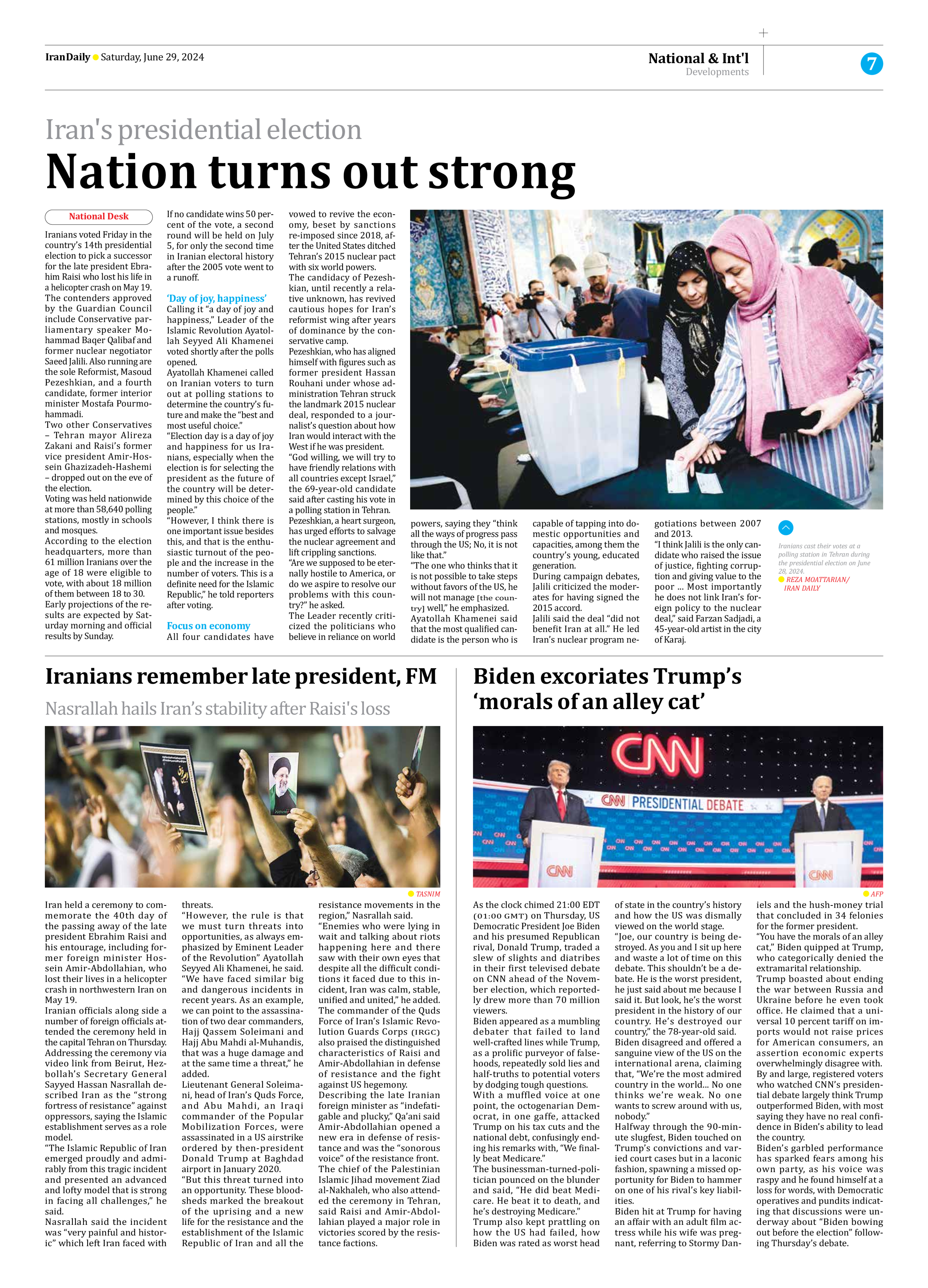
Iran’s presidential election
Nation turns out strong
Iranians voted Friday in the country’s 14th presidential election to pick a successor for the late president Ebrahim Raisi who lost his life in a helicopter crash on May 19.
The contenders approved by the Guardian Council include Conservative parliamentary speaker Mohammad Baqer Qalibaf and former nuclear negotiator Saeed Jalili. Also running are the sole Reformist, Masoud Pezeshkian, and a fourth candidate, former interior minister Mostafa Pourmohammadi.
Two other Conservatives – Tehran mayor Alireza Zakani and Raisi’s former vice president Amir-Hossein Ghazizadeh-Hashemi – dropped out on the eve of the election.
Voting was held nationwide at more than 58,640 polling stations, mostly in schools and mosques.
According to the election headquarters, more than 61 million Iranians over the age of 18 were eligible to vote, with about 18 million of them between 18 to 30.
Early projections of the results are expected by Saturday morning and official results by Sunday.
If no candidate wins 50 percent of the vote, a second round will be held on July 5, for only the second time in Iranian electoral history after the 2005 vote went to a runoff.
‘Day of joy, happiness’
Calling it “a day of joy and happiness,” Leader of the Islamic Revolution Ayatollah Seyyed Ali Khamenei voted shortly after the polls opened.
Ayatollah Khamenei called on Iranian voters to turn out at polling stations to determine the country’s future and make the “best and most useful choice.”
“Election day is a day of joy and happiness for us Iranians, especially when the election is for selecting the president as the future of the country will be determined by this choice of the people.”
“However, I think there is one important issue besides this, and that is the enthusiastic turnout of the people and the increase in the number of voters. This is a definite need for the Islamic Republic,” he told reporters after voting.
Focus on economy
All four candidates have vowed to revive the economy, beset by sanctions re-imposed since 2018, after the United States ditched Tehran’s 2015 nuclear pact with six world powers.
The candidacy of Pezeshkian, until recently a relative unknown, has revived cautious hopes for Iran’s reformist wing after years of dominance by the conservative camp.
Pezeshkian, who has aligned himself with figures such as former president Hassan Rouhani under whose administration Tehran struck the landmark 2015 nuclear deal, responded to a journalist’s question about how Iran would interact with the West if he was president.
“God willing, we will try to have friendly relations with all countries except Israel,” the 69-year-old candidate said after casting his vote in a polling station in Tehran.
Pezeshkian, a heart surgeon, has urged efforts to salvage the nuclear agreement and lift crippling sanctions.
“Are we supposed to be eternally hostile to America, or do we aspire to resolve our problems with this country?” he asked.
The Leader recently criticized the politicians who believe in reliance on world powers, saying they “think all the ways of progress pass through the US; No, it is not like that.”
“The one who thinks that it is not possible to take steps without favors of the US, he will not manage [the country] well,” he emphasized.
Ayatollah Khamenei said that the most qualified candidate is the person who is capable of tapping into domestic opportunities and capacities, among them the country’s young, educated generation.
During campaign debates, Jalili criticized the moderates for having signed the 2015 accord.
Jalili said the deal “did not benefit Iran at all.” He led Iran’s nuclear program negotiations between 2007 and 2013.
“I think Jalili is the only candidate who raised the issue of justice, fighting corruption and giving value to the poor ... Most importantly he does not link Iran’s foreign policy to the nuclear deal,” said Farzan Sadjadi, a 45-year-old artist in the city of Karaj.







